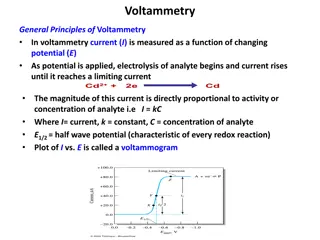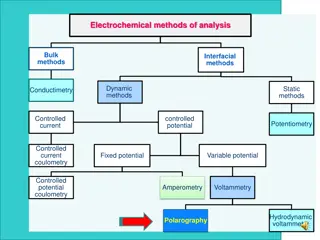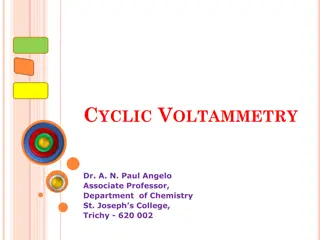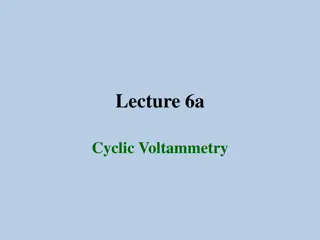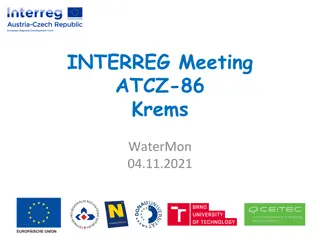Understanding Voltammetry: Principles and Applications
In voltammetry, current is measured as a function of changing potential. The magnitude of current is directly proportional to the activity or concentration of the analyte. A voltammogram is plotted between current and potential, showing the characteristic half-wave potential. The process involves a
6 views • 76 slides
Understanding Polarography in Electrochemical Analysis
Explore the realm of polarography, a type of voltammetry utilizing the dropping mercury electrode (DME) and mercury pool. Learn about classical polarographs, the Ilkovic equation, advantages and disadvantages of mercury drop electrodes, and how to minimize polarographic maxima in electrochemical ana
1 views • 23 slides
Understanding Cyclic Voltammetry in Electrochemical Analysis
Cyclic voltammetry is a crucial electroanalytical technique for studying electrochemical behavior. It involves sweeping potential in a cyclic manner to measure current responses, aiding in understanding redox processes, electron transfer kinetics, and coupled reactions. The technique requires carefu
0 views • 10 slides
Understanding Cyclic Voltammetry in Electrochemical Methods
Electrochemical methods, such as cyclic voltammetry, are crucial for studying electron transfer processes, redox reactions, and adsorption on surfaces. Cyclic voltammetry involves varying the applied potential at a working electrode to monitor electron flow and chemical reactions. Peaks in the curre
0 views • 11 slides
Electrochemical Sensing Module Overview and Potentiostat Parameters
In this meeting, the Electrochemical Sensing Module based on the EmStat-pico potentiostat was discussed. The module features precise, low-power control unit Arduino MKR Zero and supports techniques such as voltammetry and EIS. Potentiostat parameters include a full dc-potential range, EIS frequency
0 views • 16 slides
